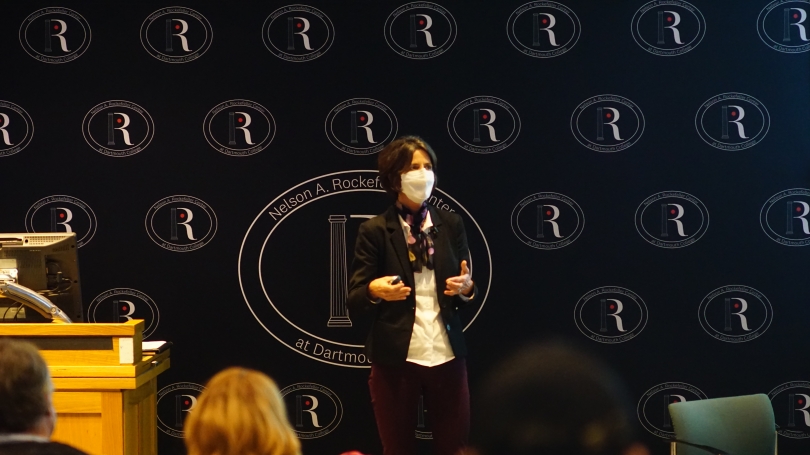
- Public Policy
- Leadership
- Funding
- News & Events
- About the Center
Back to Top Nav
Back to Top Nav
Back to Top Nav
Back to Top Nav
On Monday, November 8th, 2021, Tina Nadeau, Chief Justice of the New Hampshire Superior Court, convened with Dartmouth students and community members in Filene Auditorium for the Rockefeller Center's Perkins Bass Distinguished Lecture.
Judge Nadeau has led a distinguished career in the justice system, with much of her work having been in New Hampshire's drug courts—specialized court programs that target individuals with drug dependency problems. Among other accomplishments, in 2016 she received the New Hampshire Alcohol and Drug Abuse Counseling Association Kathleen Taylor Legislator Award; in 2017 she received the New England Association of Drug Court Professionals Leadership; and in June 2020 she was appointed as an inaugural member of the national Council on Criminal Justice and served as a member of the COVID-19 task force. Synthesizing these contributions, Nadeau's lecture outlined her approach to drug treatment in the New Hampshire court system.
In a prior lecture at the Rockefeller Center in May of 2021, Nadeau spoke about her work in drug courts. Nadeau's November lecture expanded upon that discussion by outlining the concept of "harm reduction." Harm reduction, according to Nadeau, refers to drug prevention programs that reduce crime and substance use disorder while saving money. Such programs have been widely discussed and implemented. For instance, the drug court program that Nadeau has pioneered in New Hampshire is a type of harm reduction, and other policies, such as needle exchange programs, safe consumption sites, and diversion programs, fall into this category.
While some harm reduction programs have generated controversy, Nadeau argued that in practice, harm reduction has the potential to positively reshape substance use reduction efforts. Before looking at the evidence, however, Nadeau spoke about the core principle undergirding harm reduction efforts: empathy. "Any criminal justice reform," Nadeau said, "has to start with an attempt at understanding [the patient]."
In Nadeau's view, empathy, considering a problem from the perspective of the other side, is an important way through which to reduce drug usage. All too often, people do not attempt to understand the struggles of victims of drug abuse, meaning that reduction measures are often disconnected from the causes of abuse. As an example of this phenomenon, Nadeau discussed incarceration. "Prison does not change behavior," Nadeau pointed out, noting that recidivism rates after incarceration are around 60 to 70 percent. With these sobering statistics in mind, Nadeau argued that "we need to understand what [patients] need from us."
To make this point, Nadeau discussed several patients with whom she had worked over the past decade. One person had an outburst in court due to a miscommunication by a court employee. Rather than taking punitive action against the patient, Nadeau described how she listened to the complaints, pointed out the miscommunication, and was able to transform the experience into a positive lesson. Citing other, similar, experiences, Nadeau emphasized the need for a more compassionate criminal justice system, one that facilitates redemption. Rehabilitation is "not all or nothing, it's not black and white," Nadeau said.
This led to Nadeau's discussion of operational working groups, which use services including case management, treatment providers, and bi-monthly case meetings to offer patients the resources they require on their road to rehabilitation. In one such group, a housing coordinator ensured that patients had a place to temporarily stay if they lost their housing. Nadeau also argued that sober living units should allow people to be on medical-assisted treatments, observing that medical-assisted treatment for drug addiction significantly reduces relapse rates.
Nadeau, struck by the success of harm reduction programs, has searched for other areas in which empathy could strengthen the criminal justice system. One such area is in law enforcement, where armed officers are often not equipped with the tools required to handle drug addiction and mental health cases. Employing mental health professionals, rather than armed law enforcement, could be a helpful way to deescalate mental health or drug abuse emergencies.
Likewise, Nadeau views safe consumption sites, government-provided locations where patients can use drugs, as being "an idea worth talking about." These locations provide a "clean, safe place" for patients while also ensuring that they can have discussions with caregivers who will push them toward healthier lifestyles. Nadeau noted that evidence from safe consumption site programs has indicated that they do not increase drug usage.
Finally, Nadeau concluded by imploring people working in the field of substance abuse reduction to take a "balcony" perspective to their work, being open to new data and changing their minds. With that said, however, Nadeau acknowledges that "it is really hard to get people to change their minds. Without conversations, you will get nowhere."
Written by Ben Vagle '22, Rockefeller Center Student Assistant for Public Programs